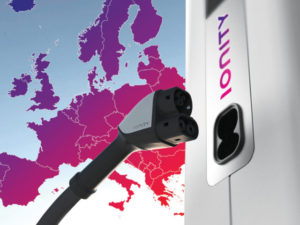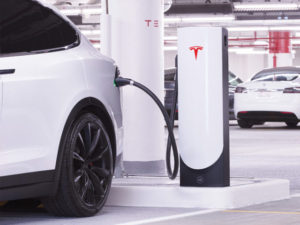The EV charging arms race
Craig Thomas looks at plans by car manufacturers to collaborate on a pan-European EV charging network.
Full details of a pan-European high-powered EV charging network – a joint venture involving four carmakers – have just been announced, making clear the scale of the changes facing the automotive industry in adapting to an electric future.
The Ionity network plans to open 20 stations by the end of 2017, another 80 during 2018 and 400 by 2020, which constitutes an €80 million investment in total. The BMW Group, Daimler AG, Ford Motor Company and the Volkswagen Group (which numbers Audi and Porsche among its brands) are collaborating on the joint venture, which will prepare the ground for a raft of electric vehicle launches in the next decade. Based in Munich, Germany, the joint venture is headed by CEO Michael Hajesch leading a team with a projected headcount of 50 by the start of 2018.
Charging ahead
Europe currently has just under 80,000 public charging stations for electric cars, but according to the International Energy Agency, at the end of 2016 there were only about 5,800 European fast charging stations, which operate at a rate of 43kW or above.
The Ionity charge points, however, will each have a power of 350kW, placing them among the fastest high-powered chargers (HPCs) available to the public to date. The network will use the Combined Charging System (CCS) European standard in an attempt to significantly reduce charging times compared to existing systems. For example, Tesla’s Superchargers have a rating of 120kW, taking 30 minutes to supply cars with around 170 miles of driving. In contrast, the Ionity chargers will be almost three times faster, but Tesla CEO Elon Musk has already suggested that he has ambitions to improve on that, describing the 350kW chargers as a “children’s toy” in a post on Twitter.
Either way, a charging arms race will only benefit users of electric vehicles as the number of models on-sale promises to increase dramatically from the end of the decade. Premium brands such as Volvo, Porsche, Audi and BMW all have all-new EVs slated for launch by the end of the decade, while Daimler CEO Dieter Zetsche expects electric vehicles to comprise 15-25% of Mercedes-Benz sales by 2025. Ionity’s brand-agnostic approach and Europe-wide coverage is designed to help make electrified vehicles more appealing to consumers by eliminating the range anxiety that is currently acting as a barrier to uptake.
Mission statement from Stuttgart
One of the new models that will be able to take advantage of the new network is the Porsche Mission E. The brand is playing an active role in Ionity, in preparation for the launch of the car, with Oliver Blume, chairman of Porsche’s executive board saying: “The launch of Ionity represents a breakthrough in the move towards a comprehensive rapid charging infrastructure in Europe.
“Creating a functioning charging infrastructure is necessary for ensuring electromobility is accepted and further expanded. With the rapid charging network from Ionity, we are ensuring that our customers can use electric cars on long journeys without compromising on convenience. These high-charging stations are capable of charging our Mission E to 80% in just 15 minutes – equivalent to a range of 400km,” he adds.
Officially launching the company, Hajesh said: “The first pan-European HPC network plays an essential role in establishing a market for electric vehicles. Ionity will deliver our common goal of providing customers with fast charging and digital payment capability, to facilitate long-distance travel.”
Initially located on major roads in Germany, Norway and Austria, at 120km intervals and situated at Tank & Rast, Circle K and OMV service stations, the nascent network will expand to other European countries over the next three years.
Ionity also says that, in principle, it would welcome other manufacturers to its ranks. As General Motors, Fiat-Chrysler, Tesla, Hyundai and Toyota all support the CCS standard, any or all of them could potentially jump onboard the HPC juggernaut that might be trundling along at the moment, but which – if the carmakers backing Ionity are right – is set to accelerate in the next decade.



